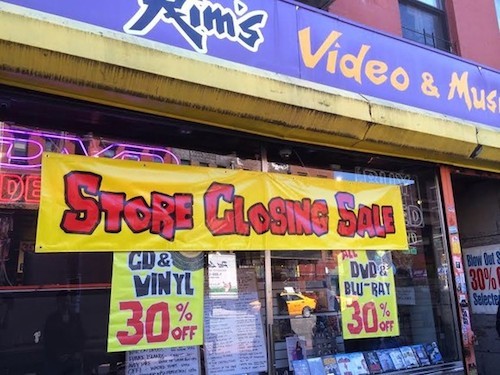I take issue with Emilie Friedlander’s claim that Kim’s was the snobbiest record store in New York City; that title belongs to Other Music, whose microfine genre shelving distinguished, for example, “trance” from “dream.” But Kim’s was cool, and its employees liked bands and movies that you did not know about. Paradoxically, that made them cool to those of us who prided ourselves on not liking what other people liked. The defining feature of popular culture was that everybody knew about it, and popularity correlated inversely with quality—in tastes, at least, if not in individual works. Except now, thanks to the internet, everybody knows about everything.
James Murphy discussed this problem in “Losing My Edge.” Back when the distribution of music and other cultural products was dominated by a few large corporations—when aficionados struggled against what Steve Albini called “The Problem With Music“—esoteric tastes were a measure of commitment. By virtue of its distance from a major label, every band was more or less difficult to hear about than other bands, so what you liked was a rough indicator of the resources you had invested in music.
If you liked The Slits, it was a sign that you had looked through enough record collections at parties and read enough zines and talked to enough geeks to hear about The Slits. Even if certain bands were difficult or unpleasant to listen to, such as my beloved Choking Victim, a person who liked them probably knew more about music than you. Taste, therefore, demonstrated not just what kind of culture you liked, but also how much you cared about culture itself.
Thorstein Veblen would argue that taste was an indicator of economic class, which it certainly is. But 100 years after his depressingly Marxist critique, taste also meant something more to the broad swath of bourgeoisie that was young America. To care about obscure bands was to reject the perceived conformity of popular culture, to demand a more nuanced reading of the human experience than “Baby Baby” and therefore to assert a certain kind of life. For me—and, importantly, for a bunch of people similar to me—that assertion was central to my identity.
“If you go home with somebody, and they don’t have books,” John Waters said, “don’t fuck ’em.” Besides the sheer unlikelihood of Waters coming out against [freaking] under any circumstances, this admonishment captures the value of aesthetics as an indicator of personality. Contemporary society does not want you to read. It wants you to buy shoes and go see Tom Cruise in a version of Groundhog Day where everything explodes. To resist this pressure and insist that aesthetics matter is to join a kind of low-grade cultural resistance, an underground of bohemian consciousness.
Hypothesis: when the underground wins, its members don’t recognize one another anymore. Thanks to the internet and probably some other titanic forces we haven’t identified, the hegemony of mainstream culture is weaker than it’s ever been. Top 40 radio still exists, but who listens to music on the radio? The mall still has a CD store, but you don’t need to go in there to learn about new bands. You don’t even need to go to parties. You can read some blogs and download Spotify, and you have access to almost every piece of music ever made.
In theory, this is the world we always wanted. The stranglehold of mainstream culture has been broken, and now everyone can listen to the bands we always knew they should. In practice, though, a central part of our identities has been dashed—or worse, distributed to everyone else.
A charming stranger and I talked about this problem the other night. In college, listening to weird music was a hobby, a social scene and a biography all at once. Now it’s a list of bands. Everyone can read that list and pick whatever they like, which solves a problem but robs us of the meaning we found in the old workaround. Liking The Slits just means you like The Slits.
I’m losing my edge. The record collection James Murphy painstakingly assembled no longer gives him an advantage over any other DJ with an internet connection. He was there, in Ibiza in the 1980s and at the first Can show, but now the first Can show is everywhere. Kim’s is out of business because curation is no longer necessary, at least not in the same way. And now the curates must do something else.
httpv://www.youtube.com/watch?v=Bac2wHZoT2Y





We are richer, but poorer in so many ways.